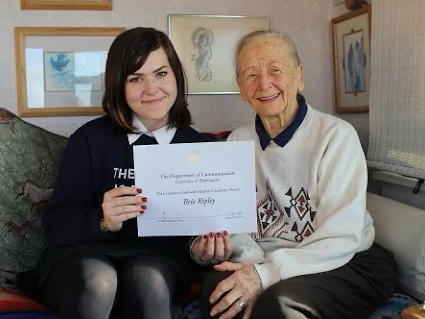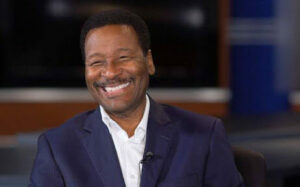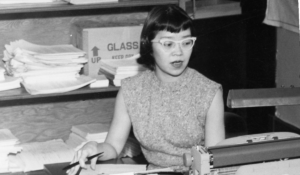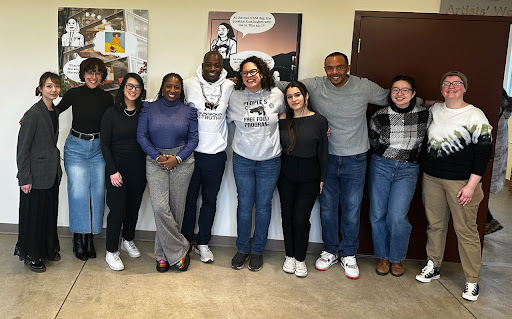We’ve all heard the statistics about New Year’s resolutions—that by February, most people’s, well, resolve has wavered, and what started as heartfelt ambitions are abandoned as we surrender to the habits of yesteryear. But whether you’re a believer or a skeptic about the power of New Year’s resolutions, periodically making time to reflect on what we want to cultivate or prune from our individual and collective lives can be healthy and productive. So perhaps February is the perfect time to reignite our resolve and to commit to living our values as we head into 2024.
We asked our staff, faculty, and students to share their scholarly or professional resolutions, what they intend to cultivate this year as communication scholars and professionals.
“My intellectual resolution for the new year is to leave time for creativity. For a lot of the year I spend my intellectual time reading the same journals or news sources, engaging the same writing approaches, or occupying the same intellectual spaces. This year, my goal is to seize more moments of unexpected outcomes, read more widely outside of my usual communication and journalistic circles, and try to save time for fortuitous moments with brilliant people I don’t usually meet. I think 2024 is the year of embracing the unexpected.”
Caley Cook
“My professional resolution for the new year is to find more ways to engage the alumni and donors within the department. I hope to create intentional opportunities for alumni to grow their relationships with each other, the department, and our students.”
Megan Schoening
“My academic resolution for this year is to find stories in places unfamiliar to me. Although I’ve lived in Seattle for three years now, I find myself walking along the same paths around the city. In order to find stories and inspiration, I want to push myself to go on new adventures to see areas of the Seattle community that I have not fully explored before. I feel that this will give me a more well-rounded understanding of this area and allow me to become a better journalist.”
Elizabeth Williams
“I will try to assume the best of people rather than the worst. It’s so easy in the current moment to attribute bad motives to those who say or do things that seem wrong or foolish or hurtful. In my field of study, rhetorical inquiry, there’s something called ‘the principle of charity’ that asks readers to interpret things in their best possible light. In the new year, I’m going to make an effort to apply this hermeneutic more often.”
Leah Ceccarelli
“My resolution for 2024 – both academic and personal – is to be more present. It is so easy to be distracted by world events and busyness, so stepping back and paying attention to and enjoying the moments we are in seems likely to help build a higher quality life. I want to savor my experiences with colleagues, students, and friends more deeply than I have. I am up to the challenge!”
Valerie Manusov
A focus on experiential learning
The Department of Communication is committed to providing students opportunities to connect with alumni and friends of the department to develop their professional skills outside of the classroom. Part of this includes revitalizing our Career Kickstart program, designed to develop students’ professional skills and experiences on campus and beyond..
In the classroom, we will continue hosting our popular “Careers in Comm” panels in our large Introduction to Communication classes. These events allow students the opportunity to meet industry professionals,ask questions, and explore an array of career paths our field has to offer. We are also developing a less formal Mentor Mixer event, another opportunity for alumni to share their expertise with our students.
Outside of the classroom, our Career Exploration program gets students off campus to meet alumni in their places of work in Seattle and beyond. A group of students traveled to New York in Autumn, another group will travel to Los Angeles in February, and in April, we will launch our inaugural trip to Washington D.C. where students will learn from UW Communication alumni working in political communications, media, and more. Closer to home, students visit Seattle area workplaces in tech and media and intern at the state capitol as part of our longstanding Olympia Legislative Reporting Program. Further afield, UW Communication students are interning and taking courses in Leon, Spain as part of the ¡SpainWorks! program, and are studying in Rome with faculty members Andrea Otáñez and Valerie Manusov.
Artist in Residence John Tomasic named faculty advisor for The Daily
We asked Artist in Residence John Tomasic to share his thoughts as he steps into his new role as faculty advisor to The Daily:
“I’ve been the newsroom advisor at the Daily for about nine months — I love it. It’s inspiring to see young people diving into journalism at a time when the industry continues to face real challenges and when the country, as we all know, could really benefit from the work of more eager, emerging journalists intent on prioritizing reporting that serves the public interest, which I feel compelled to add remains a not-at-all easy skill to master.
As anyone who has spent any time at a university news publication knows, it’s a truly immersive student-life experience that the participants never forget. The Daily students really stretch themselves — [both] the editorial side and the advertising side. They work long hours together, they support and occasionally clash with each other. It’s emotional and taxing and thrilling.
It’s also a great benefit to them, the fact that it’s their job to learn about the university they attend — what’s happening on campus, how the place is run, what kind of work we’re all doing here, how much things cost, how things might be improved — everything happening on campus is fair game any day of the week; they’re always running to keep up. The sports desk this year has been riding a once-in-a-lifetime rollercoaster, while the news desk has been wrestling with many of the same kind of reporting challenges news desks at all levels … are wrestling with … covering topics like war protest, anti-semitism, misinformation, diversity and equity struggles, online troll culture, toxic media platform capitalism, [and] challenges to the machinery of democracy.
It’s also a great benefit to me — to my own thinking and writing and teaching as a member of the Communication Department faculty — the opportunity to observe up close the ways the students consciously learn in an everyday way, in sometimes small and sometimes large servings, about the complex and fluid media ecosystem we’re all living in. I mean, The Daily students as much as any of us are getting a view from the trenches — the good, the bad, the ugly — and it’s mind-bending. Sometimes you can almost see the inside of their heads changing right there as you watch them at work.”
Communication students writing statehouse stories in Olympia
Every winter quarter, students in the State Government Communication Program pack their laptops, a reporter’s notebook, and a few pairs of respectable slacks to make their way down I-5 to cover the Washington state legislative session in Olympia for 10 weeks.
In the second week of January, Journalism and Public Interest Communication (JPIC) students Aspen Anderson, Scarlet Hansen, Mary Murphy, and Jacquelyn Jimenez Romero settled into a rambling 1920s-era Craftsman-style house a mile from the state capitol as part of the program.
The four have already churned out at least nine legislative stories for The Seattle Times, Crosscut, and the Washington Newspaper Publishers Association, which feeds Olympia news to about 60 mid-size and small outlets across the state.
“It’s inspiring the way the students throw themselves into the experience,” says John Tomasic, the program director. “Each year we begin with meetings on campus to discuss past coverage and legislative leaders and bill numbers and committee hearings and so on. It can seem pretty abstract. But then the legislative circus launches and there they are in the middle of the ring, chasing lawmakers, scratching down notes in capitol hallways, publishing stories on deadline.”
In the legislative session’s opening weeks, students have covered proposals to boost resources to educate farmworkers’ children, clean up the fast-fashion industry, make voting mandatory, eliminate daylight savings time, and explore artificial intelligence and its potential impacts.
“We have been thrown into this,” Anderson said. “It’s challenging and so much fun. It’s such a unique opportunity to work here full time as journalists while still pursuing our undergrad degrees.”
According to Murphy, “I’m realizing there’s a lot to watch for underneath the stories presented for the public by people in power here. I’m hoping before the session ends to peel back layers and find the stories under those stories.”
This year’s “short” legislative session is already approaching its mid-way point. The session will end the first week of March, which coincides with the end of winter quarter instruction at the UW.
Alexa Bednarz Spotlight
Communication alumna Alexa Bednarz is making her dream a reality. Bednarz ‘12, , recently broke ground on the first manufacturing facility for Eco-Shelter, a company that works to increase access to sustainable building materials. According to Bednarz, the idea for Eco-Shelter started during her time as an undergraduate.
“I never contemplated being an entrepreneur as an option [during my undergrad] … but now my knowledge and experience has come full circle,” Bednarz said. Following a seven year position with the Bill & Melinda Gates Foundation, Bednarz’s knowledge of fundraising and customer discourse inspired her to make what started as a class project a reality.
After raising $1 million to support the initiative, Bednarz plans to launch Eco-Shelter’s primary production facility in India, where low-income households often have inadequate roofing. She then aims to bring sustainable roofing to the United States.
Honoring the Legacy of Pat Cranston

This year we remember Patricia Cranston, the first female tenured professor at the then-UW School of Journalism. Born in 1925, Cranston loved reading, which she said translated to her later love of learning and teaching.
Cranston attended the University of Texas for both her undergraduate and graduate degrees, with a brief stint pursuing a television career in New York. She arrived in Seattle during an era when female educators faced immense discrimination, but over her 35 years at the UW, she worked hard to open doors for herself and other female faculty and students .
Cranston passed away this summer at the age of 98. She will be remembered for her dedication to helping students find enjoyment and professional fulfillment in the field of journalism. In her will, Cranston asked that a memorial be held to honor the lives of her and her partner of 30 years— attendees were asked to make donations to UW Communication’s Cranston Creativity Fund.
The Patricia Cranston Student Creativity Endowed Fund in Communication continues to support students in their pursuit of professional opportunities and to encourage student creativity in all forms.
“This award and my undergraduate education mean a lot to me,” Brie Ripley, a 2015 recipient of the award, said. “I want to remember how I started and all of the incredible people who have supported me along the way.”
A Local Legend Remembered

Steve Pool, esteemed member of UW Communication’s Alumni Hall of Fame, passed away in November 2023. For over 40 years, Pool reported for KOMO 4, Seattle’s ABC affiliate, winning multiple Emmys for his work. Pool is best known for his commitment to excellence and for breaking ground as one of the first Black weather forecasters in the country. He retired from television in 2019 and continues to be remembered fondly by his friends in UW Communication and the generations of Seattlites who counted on his forecasts and his warm smile.
From First Generation to Future Generations

Kay Tomita Hashimoto (BA, journalism, 1952), was a first-generation college student who went on to become a print and radio reporter who later worked for the Japan-America Society in Seattle and the Environmental Protection Agency. Hashimoto’s three children recently made two generous gifts to the UW Department of Communication—including an endowed scholarship to support students—to honor their mother’s legacy as a first-generation college graduate and trailblazer as a woman of color working in the field of journalism in the mid-20th century. To honor her legacy, Hashimoto’s children recently donated to the Department in their mother’s name to support the next generation of journalists and professional communicators.
Interrupting Privilege Museum Exhibition at the Northwest African American Museum
On Martin Luther King Jr. Day, the Center for Communication, Difference, and Equity (CCDE) held an Interrupting Privilege Museum Exhibition at the Northwest African American Museum (NAAM). The exhibit featured interactive multimedia content allowing attendees to explore the history and methodology of the Interrupting Privilege program and the powerful stories it has curated in recent years. The CCDE’s exhibit provided a space for both students and the broader Seattle community to engage with the voices of community members as they discuss their experiences with race and racism and to reflect on the ways we might all interrupt privilege.

Preview of Upcoming Departmental Programs
- Husky Giving Day: April 4, 2024
- Scheidel Lecture: April 17, 2024, 5:30-7:30 p.m.
- COM Colloquium by Angèle Christin, “Follow Me: Influencers, Platforms, and the Rise of the Follower Economy”: May 8, 2024 via Zoom
- Scholarship and Excellence Awards Ceremony: May 22, 2024, 5:30-7:30 p.m.
Celebrating the academic achievements of our students over the 2023-2024 school year and recognizing the donors and recipients of the 2024-2025 scholarship awards. - Department of Communication Graduation Ceremony: June 4, 2024.
Doors open at noon, and the ceremony begins at 1 p.m.
Newsbites
- Professor Leah Ceccarelli was awarded the Outstanding Mentor Award by the American Society for the History of Rhetoric in November. Ceccarelli is currently serving as the graduate program coordinator, and she researches and teaches courses on the rhetoric of science. Ceccarelli’s mentees praised her empathy and generosity, qualities she says she learned from her own mentor. One advisee noted that Ceccarelli with every visit to her office he “grew as a scholar, a teacher, and academic.”
- This winter the work of two doctoral candidates in the Department of Communication, Laura Irwin and Lando Tosaya, will be featured in the book Weaving a Web Together: How to Create Accountability and Support Structures for Graduate Students. Their chapter examines how different doctoral training programs can effectively recruit, retain, and support underrepresented graduate students.
- On Feb. 1, the department hosted Sally McMillan, professor emerita from the University of Tennessee, for a colloquium lecture. Her talk, “Digital Immigrants and Media Integration: The Smartphone is the Synthesizer,” examines the media evolution that has shaped the communication tools we use today.
